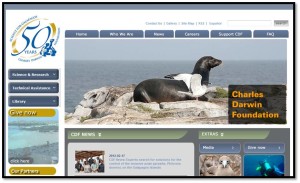By Penny Paugh
The Galápagos Islands off the western coast of South America are renowned as an evolutionary and ecological living laboratory. These Pacific islands can serve as a barometer to gauge how climate and ecosystems interact, and provide a unique window into the relationship between mankind’s rapid development and a continuously changing environment.
The key to understanding how global climate change will likely affect the future of the islands lies in part in understanding the past. Strong El Niño Southern Oscillation (or ENSO) events have greatly shaped the living communities of the islands over millennia, as the archipelago naturally experiences huge regional climate changes.
El Niño represents the greatest natural disturbance to Galápagos ecosystems; without considering anything else, anticipating these natural events is extremely important for biodiversity management. During El Niño events, such as those in 1981/1982 and 1997/ 1998, marine ecosystems starved as upwelling cold water destroyed habitats. Important species that sustained entire communities, such as coral and macroalgae, were devastated. Breeding success for coastal fauna dropped, nesting patterns changed, and a large number of mortalities were observed in birds, reptiles, and sea lions.
On land, species introduced from outside flourished and persisted, and directly threatened native and endemic species better adapted to otherwise arid areas.
The Charles Darwin Foundation is conducting research to identify the priority vulnerable species and prepare management plans to reduce human-caused threats from fisheries, tourism, and other activities. Scientists expect that the Galápagos penguin, the marine iguana, nesting green turtles, corals, and macroalgaes are particularly susceptible to climate change. Land-based reptiles, adapted to arid conditions and whose reproductive patterns (gender development) depend on nest temperature, will also be studied.
Global climate change could also cause shifts in global resources, markets, and economies that will influence livelihoods of Galápagos inhabitants. Studies will seek to anticipate such impacts on the Galápagos economy in order to help the local population adapt. The project will incorporate scientific research, community outreach, and advice to management authorities to create a long-term monitoring system for the Galápagos, which will enable more informed planning and decision-making.
Time is short if we are to proactively improve how we protect our natural heritage. The Galápagos Islands, being relatively data-rich, have the potential to serve as a barometer for different climate change scenarios, and to begin to answer these immediate pressing questions in order to bring existing information to bear upon the climate change problem.
Reference
Charles Darwin Foundation. “Impact of Climate Variability and Change upon the Galápagos Archipelago”. 26 April 2012. <http://www.darwinfoundation.org/english/pages/interna.php?txtCodiInfo=84>


Comments are closed.